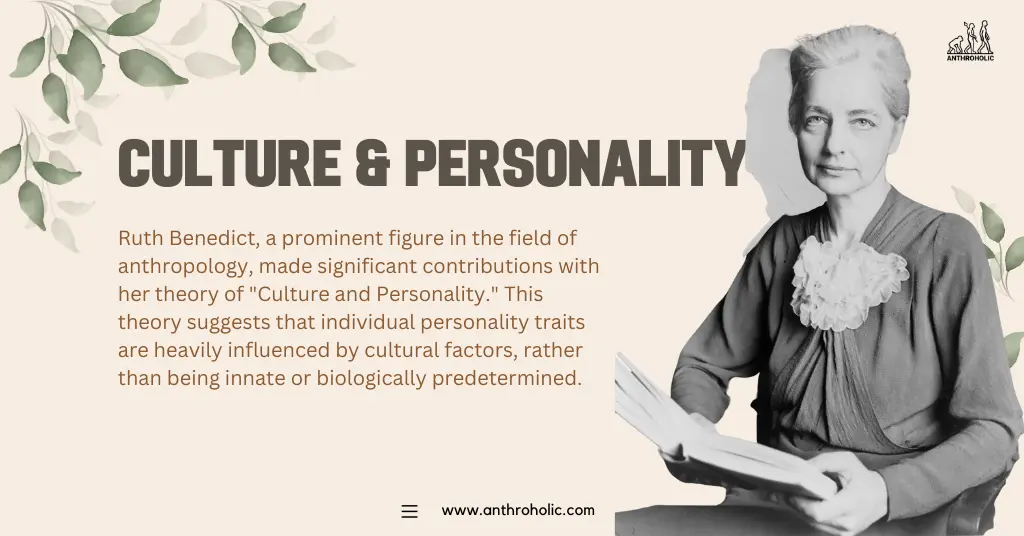AI Answer Evaluation Platform Live Now. Try Free Answer Evaluation Now
Culture and Personality
Ruth Benedict, a prominent figure in the field of anthropology, made significant contributions with her theory of “Culture and Personality.” This theory suggests that individual personality traits are heavily influenced by cultural factors, rather than being innate or biologically predetermined. Benedict posited that culture shapes the ways in which individuals think, feel, and act, thereby influencing their personality development.

Core Principles of Culture and Personality Theory
- Cultural Determinism: The belief that the culture in which we are raised largely determines our behaviors and personalities.
- Personality Types in Culture: Benedict theorized that every culture tends to favor certain personality traits and discourage others.
- Synergy Between Culture and Personality: The interaction between an individual’s personality and their cultural environment is seen as a dynamic process.
Case Study: The Zuni People
Example: The Zuni, a Native American tribe, were studied by Benedict. She noted their culture emphasized values like moderation, restraint, and a dislike for extreme emotional expressions.
Table: Comparison of Zuni and American Personality Traits
| Trait | Zuni Culture | American Culture |
|---|---|---|
| Emotional Expression | Restrained | More Expressive |
| Value System | Moderation | Individualism |
| Social Behavior | Community-focused | Individual-focused |
Case Study: The Dobu Islanders
Example: The Dobu Islanders of Papua New Guinea were another focus of Benedict’s research. She observed that their culture was based on suspicion, witchcraft beliefs, and competitiveness.
Table: Comparison of Dobu and Zuni Cultural Traits
| Cultural Element | Dobu Islanders | Zuni People |
|---|---|---|
| Social Trust | Low (Suspicion) | High |
| Belief Systems | Witchcraft | Spiritual Harmony |
| Interpersonal Relations | Competitive | Cooperative |
Criticisms and Limitations
While influential, Benedict’s theory has faced criticism for potentially overgeneralizing cultures and underestimating the variability within cultural groups. Critics argue that the theory might oversimplify the complex interplay between culture and personality. Despite criticisms, Benedict’s “Culture and Personality” theory remains a cornerstone in anthropological studies. It paved the way for understanding how cultural contexts shape individual behaviors and personality traits.
Application in Modern Anthropology
With the evolution of cultural studies, Benedict’s theory continues to influence contemporary anthropology. It serves as a foundation for understanding the relationship between culture and individual behavior in diverse societies.
Case Study: Japanese Society
Example: Benedict’s work on Japanese culture, particularly in her book “The Chrysanthemum and the Sword,” is a notable application of her theory. She examined how Japanese culture values honor, respect, and hierarchy, shaping the personalities of its people.
Table: Traits in Japanese and Western Cultures
| Trait | Japanese Culture | Western Culture |
|---|---|---|
| Social Hierarchy | Strongly Defined | Less Defined |
| Value System | Honor and Respect | Individual Rights |
| Conflict Resolution | Avoidance | Direct Confrontation |
Case Study: Contemporary Global Cultures
In the modern globalized world, the theory helps in understanding cultural assimilation and the development of multicultural identities. For instance, how immigrants integrate and negotiate their native cultural traits with those of the host country.
Table: Multicultural Identity Development
| Cultural Aspect | Native Culture | Host Culture | Integrated Identity |
|---|---|---|---|
| Social Norms | Varies | Varies | Blend of Both |
| Value System | Traditional | Modern/Western | Hybrid |
| Language | Native Tongue | Host Language | Bilingual Proficiency |
Impact on Other Disciplines
Benedict’s theory transcends anthropology, influencing fields like psychology, sociology, and cultural studies. It provides a framework for understanding how culture impacts mental health, social behavior, and interpersonal relationships.
Conclusion and Future Directions
Ruth Benedict’s “Culture and Personality” theory remains a significant contribution to anthropology. Its relevance extends into contemporary studies of cultural identity, globalization, and multiculturalism. Future research may continue to explore the nuances of cultural influences on personality, adapting Benedict’s insights to the complexities of an increasingly interconnected world.
Benedict’s theory is particularly relevant in our contemporary, globalized world, where cultural intersections are increasingly common. It offers a framework for understanding how individuals navigate and reconcile the often conflicting demands of multiple cultural identities. For example, in multicultural societies, individuals may blend traits from their heritage culture with those of their adopted culture, leading to unique personality formations that reflect a synthesis of cultural influences.
Furthermore, Benedict’s insights have profound implications for areas such as cross-cultural psychology and international relations. Understanding how cultural norms shape personality can aid in developing more effective communication strategies and fostering greater empathy between different cultural groups. It also highlights the importance of cultural sensitivity in global politics, business, and education.




